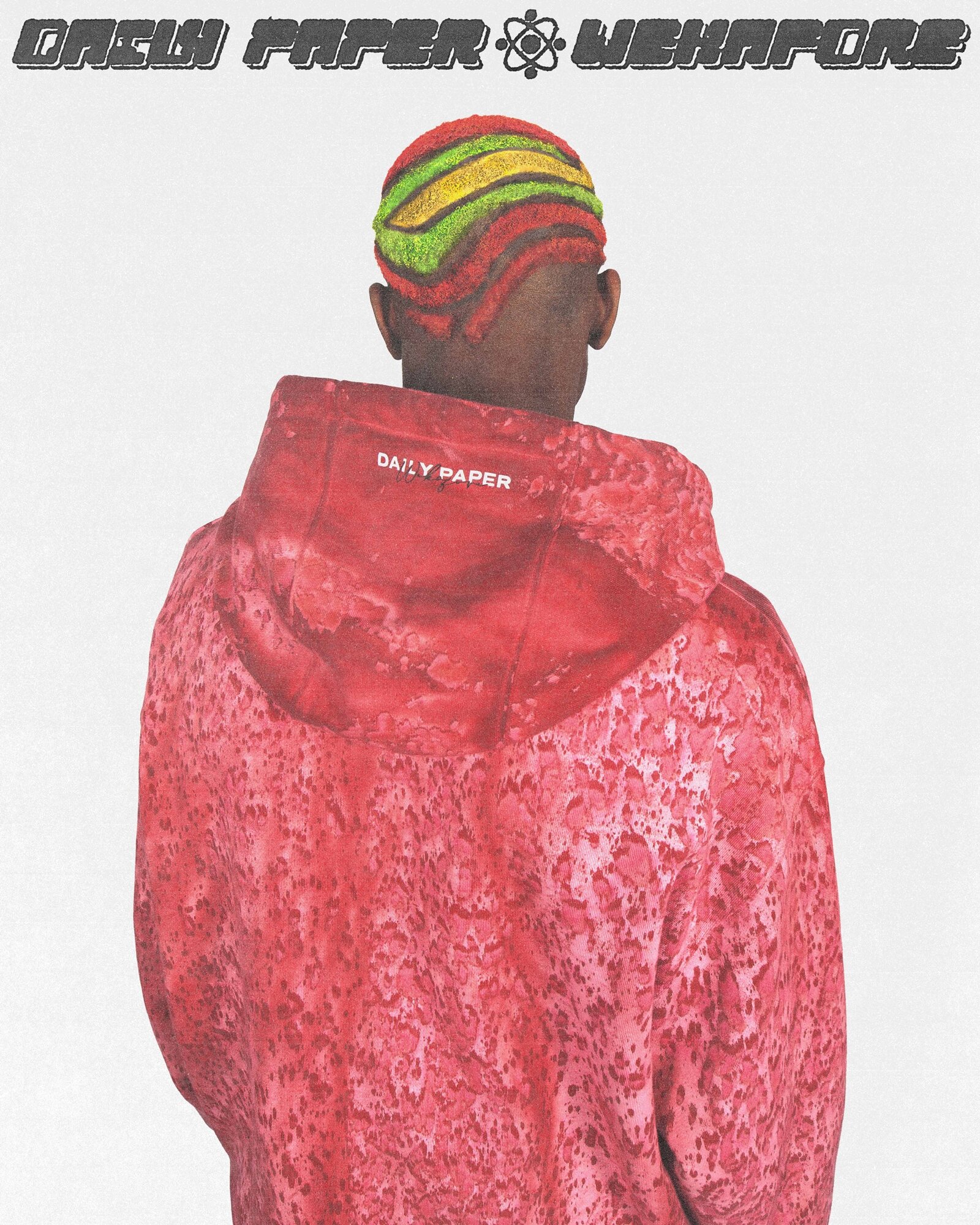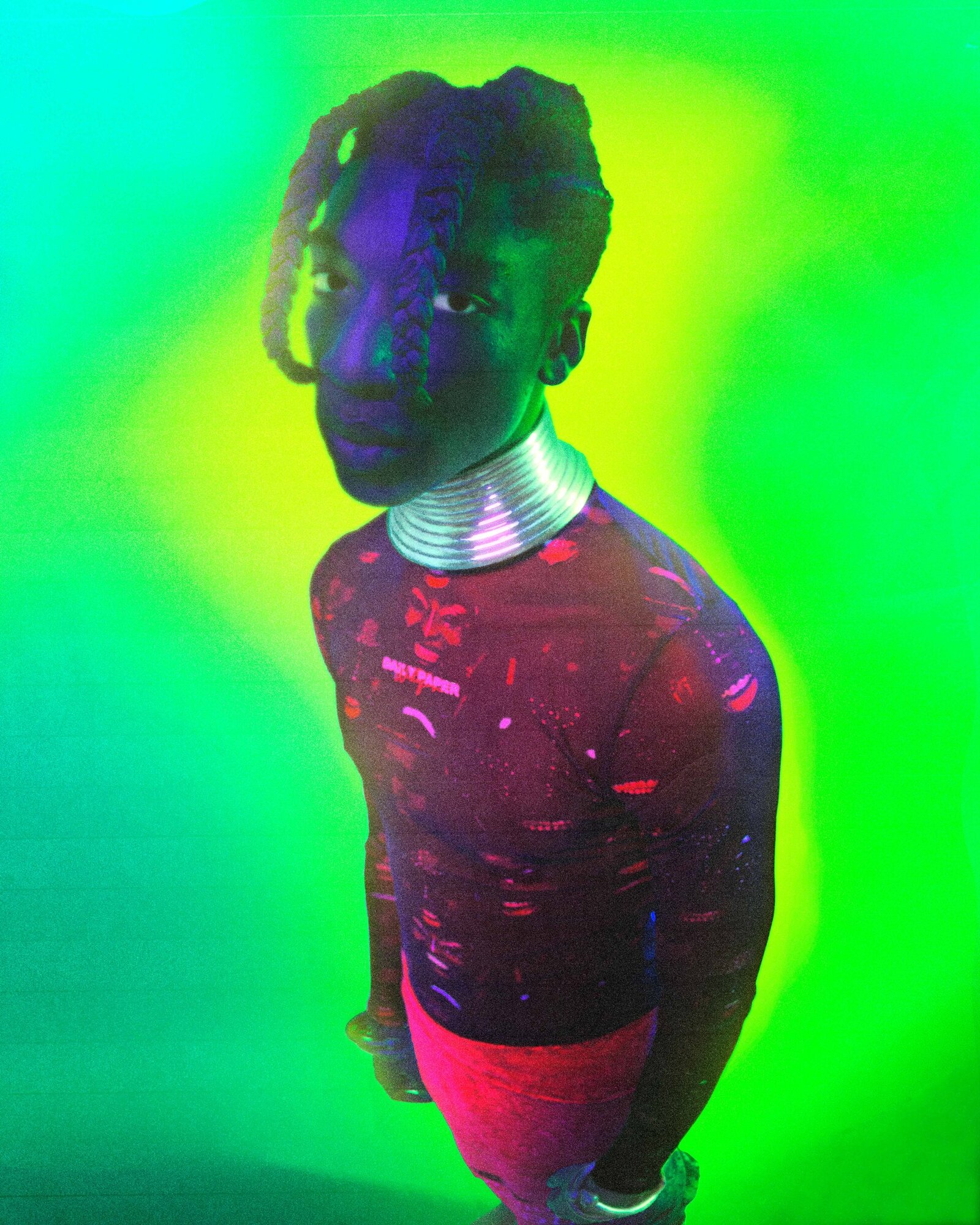Exclusive: As their collaboration drops, we sit down with Daily Paper’s Abderrahmane Trabsini and Wekaforé Maniu Jibril
The centre of Daily Paper and Wekaforé’s Venn diagram has a very healthy crossover. At the heart of both brands is a desire to push the conversation forward and create a future that’s defined by African pride. It’s community, not hype, that motivates them both. So, the question is not, what has brought them together, but why it hasn’t happened sooner.
Their shared reference points usually manifest in completely different ways but with this new collection, entitled The Spirit Don’t Die, there’s a palpable sense of synergy. It incorporates some of Wekaforé’s slinkier silhouettes - tight tops that are suitable for his Voodoo Club nights - and face prints inspired by Fela Kuti and his Kalakuta queens that are reminiscent of the Nigerian designer’s previous work. These are translated using Daily Paper’s signature ability to make the everyday extraordinary. Black denim jackets and flares go hand in hand with tie-dyed hoodies and Ts.
Created entirely remotely due to travel restrictions - Wekaforé in Barcelona, Daily Paper in Amsterdam - this limited edition capsule takes its cues from Africa’s post-Independence golden age and the birth of Pan-Africanism. Aside from the undisputed king of afrobeats, anti-Apartheid posters from South Africa and imagery of the Black Panter Party were all on the moodboard, as well as the psychedelic vibes of Joni Haastrup.
We sat down with Wekaforé and Daily Paper co-founder Abderrahmane Trabsini (who runs things with friends Hussein Suleiman and Jefferson Osei) to discuss their collaboration, shared values and how it all came together.
Wekaforé: I learned about Daily Paper in 2015, back when I was living in Dubai, that's when I met Jeff and I’ve kept up with their work ever since.
Abderr: And, yeah, I knew Wekaforé through our colleague, who proposed the collaboration. I think it's an amazing brand. I feel like we have the same inspiration but a whole different outcome. It’s interesting that we share an aesthetic but it manifests in different ways, so for me, it was cool to collaborate and bring together these two worlds. A lot of brands think they need to collaborate with brands that are bigger in order to grow, but we prefer to create an audience for smaller brands that share our values. Those are my favourite to work on design-wise.
“I like freaky shit and I like going into the ugly, dark places in order to bring out the light”
Wekaforé: As brands, we share that same consciousness and emphasis on community; we’re aware of our positions and of our intentions. When you find someone with the same spirit as you or who’s on the same journey as you, working with them is a no brainer - you can’t deny it. The spirit don’t lie and the spirit don't die.
Abderr: Yeah, man and that’s how we were able to give you complete freedom. We still wanted to make stuff that fit our aesthetic but if you look at it as a whole, I think it’s a good outcome and it equally represents both brands. What I love about the collection was the print, which is so you but on our silhouettes. I’m excited to show people the work.
Wekaforé: I had to find the middle ground between what I like and what you like, because I like freaky shit and I like going into the ugly, dark places in order to bring out the light. So we did that with the prints and put them on something that can be worn every day, so you’re sending the message every day. It was fun because it's a bit like politics, or ping pong - batting ideas back and forth until everyone is happy. Something that was also a no-brainer for both of us was referencing Fela Kuti in the collection. My dad used to play his music when I was younger but back then, it was sort of like an older people thing. Then as I grew up, I started to understand and take him seriously. It was maybe in 2016 that I began really researching about him and the whole era. How about you?
Abderr: I'm a big jazz fan and in order to learn about artists, I play a lot of mixes. I heard Fela Kuti so shazamed it and I loved it, man. Even the art direction of the albums, it’s amazing. When I’m in Ghana, I always go to that vintage vinyl shop and see a lot of those Fela Kuti covers and I'm like, yeah, that's sick. The music is amazing, it has such a unique sound and it stands out. So I think it's dope, and it's from Africa, you know, it's a win for our continent.
Wekaforé: When I think of that era, just after Independence, it must have been crazy. Having all of those reasons to party, the freedom to be wild and be everything you wanted to be before. And I also wonder if psychedelics from Woodstock also got to Africa during that time? And then with Afrofuturism, I see it more as a necessity to survive and to thrive as an African, or as a person of African descent, in the world we are in right now. I think philosophically, Afrofuturism is about being able to think forward and having an awareness and consciousness about being Black, being African and how do I think about a future with my blackness?
Abderr: As a brand, it's very important. We're pro Afrofuturism because the goal is to change the perspective of Africa and show people that we're also pioneering and that there's a lot of beautiful things happening there, which often aren't showcased. I mean that's my biggest inspiration and you can see it in our imagery. We really want to push that aesthetic but on a higher level and show people that we Africans can make cool things as well.
Wekaforé: Creating a future without considering the Western or European gaze is difficult though, isn’t it. With globalisation it's almost impossible to think about Africanness outside of the global context, so although we would love to say we'll have to create a future without the Western mindframe, I don’t know who's going to be able to delete that from their mind.
Abderr: Yeah. We're an example of how we want to do it in our own way. You know, we're products of our environment and of African descent who grew up in a Western country but we add our flavour into it. And my life values are based on my culture. I grew up in a very Moroccan household, which kept me grounded and I speak the language. So, it’s always a blessing to give back to the Motherland. We do pop-up shops in Ghana to make sure the continent isn't far away from our product. When it comes to design, our aesthetic is obviously inspired by African culture but we interpret it our own way and make it more accessible to wear. We made a jacket recently that says, from ‘Africa to the world’ and it gives you that feeling of actually being represented.
The Daily Paper x Wekaforé collection will be available online and in Daily Paper flagship stores in Amsterdam, London, and New York on Friday 15 October 2021
Words Miriam Bouteba
Photography Raghe Farah
Styling Rebecca Sueiro
Make-up Itziar Nzang
Hair Gloria Rico
Creative production Voodoo Agency
Graphic design Neuf Artist Lab
Talent Joe Diao,
Junior Osas,
Soraya Zilati,
Khadija Niang,
Olayinka Adisa,
Roqueeb Adebayor,
Martins Omundiale,
Bamidele Egbunike
Visit Daily Paper
Visit Wekaforé
Published on 13/10/2021






